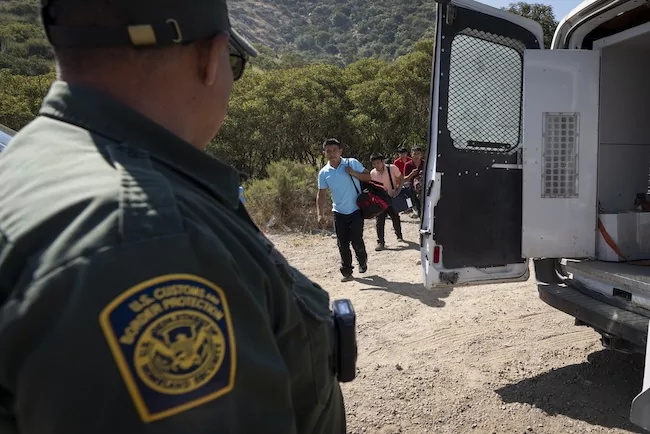
The Supreme Court appears poised to uphold a decision by the Department of Homeland Security to revoke the visa of a U.S. citizen’s husband after evidence surfaced that he used a “sham marriage” to enter the country illegally. The decision could have sweeping implications for future immigration policies.
Justices were tasked with reviewing a statute passed by Congress that says federal courts can only review initial denials of visa applications, but not any actions that the DHS takes later in the process to revoke a visa it’s already granted. Congress intended to prevent federal courts from overriding the DHS’s authority when making the agency decide to revoke a visa status.
The case, Bouarfa v. Mayorkas, surrounds U.S. citizen Amina Bouarfa’s husband. He was granted a visa by the DHS to remain in the country, but the agency reversed its course after reviewing evidence of his entry into the country. Such arrangements typically result in permanent blocks on a person remaining in the country.

Several members of the 6-3 Republican-appointed majority on the high court appeared skeptical that there was any gray area surrounding the statute’s “good and sufficient” reasoning language, which offers the DHS the ability to second-guess previous approvals when the agency believes a mistake was made when granting a visa.
Both the government and the petitioners also agreed that if the initial application for Bouarfa’s husband had been denied, that decision could have been appealed to federal courts for review.
Chief Justice John Roberts pointed out that Bouarfa’s husband could file an entirely new visa application and receive judicial review over that decision when his current visa gets denied.
But an attorney for the plaintiffs, Samir Deger-Sen, said it is not a solution to send an applicant back to the beginning of the process, citing the years it can take for the DHS to come to an initial determination and the stress that doing so would place on families.
“Well, I mean, I think that underscores what this says about the government’s position. From our perspective, the harm is that there would be years of additional delay,” Deger-Sen added.
Although migrants can challenge deportation orders, the outcome of this case could make it more difficult for some migrants to remain in the U.S. as it may limit their ability to appeal decisions made by immigration officials to revoke their visas.
With a significant case backlog, the DHS could commit errors in determining who is allowed to stay, immigration advocates have warned. The Supreme Court case heard on Tuesday comes as the immigration system struggles with more than 3 million cases pending in immigration courts.
In some instances, first court appearances are being scheduled as far out as 2027. Additionally, since 2021, there have been approximately 10 million encounters with migrants attempting to enter the U.S. at the southern border.
An eventual ruling could also have massive implications for future administrations and the way they handle denials of visa applications and current visa statuses for noncitizens. Former President Donald Trump has campaigned on a promise to deport people who have entered the country illegally.
CLICK HERE TO READ MORE FROM THE WASHINGTON EXAMINER
The American Civil Liberties Union filed an amicus brief in the case, warning of “devastating consequences” for migrants and their families should the high court refuse to undo the revocation of the petitioner’s visa. It argued that blocking judicial review could prevent the courts from addressing even clear constitutional violations, such as decisions based on racial biases.
A decision in the case is expected by the end of the high court’s term in June.






